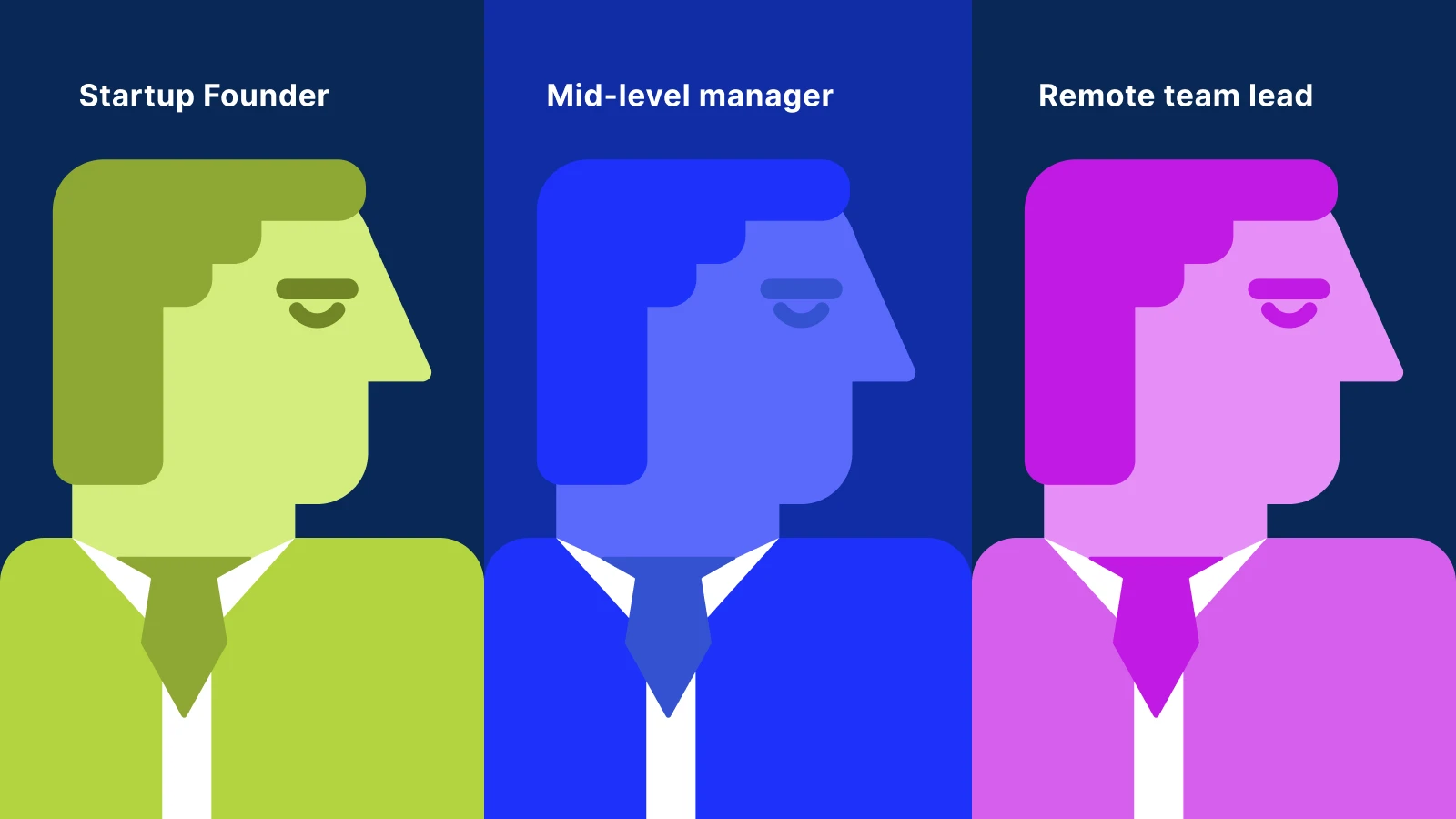TEST: How overwhelmed do you feel as a manager these days?
What does your Monday look like at 9:00 am?
A. Tea, to-do list, 10 minutes of silence. Everything is according to plan. (1 point)
B. Coffee in hand, laptop in bed. Something is getting done. (2 points)
C. Hell, chat is on fire; Zoom in 2 minutes; I'm in my pajamas. (3 points)
2 How do you delegate tasks?
A. Clear instructions, deadline, and trust. Let's go! (1 point)
B. I drop it in Slack with the words, "Please look when you have time." (2 points)
C. I panic and shout into the team chat, "WHO CAN DO THIS RIGHT NOW?!" (3 points)
3 How many tabs do you have open right now?
A. 3–5. Everything is structured. (1 point)
B. 10–20, but I'm getting my bearings. (2 points)
C. Over 40, plus three more in my head. (3 points)
4 What is your main mantra?
A. Everything can be solved. Take it easy. (1 point)
B. The main thing is not to forget to eat. (2 points)
C. If we're going down, we're going down in flames. (3 points)
Measure your results:
6–8 points — Boss of Zen
You know how to manage yourself and your team. You delegate wisely, breathe deeply, and have a colorful and logical calendar.
9–13 points — Juggler on a tightrope
You are still holding on, but it is a little shaky.
4–18 points — Burnout fire
You do not manage your work — your work manages you. Urgent: delegate, ask for help!
Delegation is an investment in your brain, time, and profit. Imagine that only 20% of your efforts achieve 80% of your results, and the remaining 80% of your actions simply interfere. Richard Koch calls this the Pareto principle, explaining that you should not work harder but delegate more wisely.
Yet, how can you entrust tasks to others if "no one will do it better than you"?
Patrick Lencioni shows how to build teams that can be delegated without fear. In 'How to Talk to Anyone,' Lail Lowndes teaches how to communicate in a way that inspires, not controls. The Headway app offers book summaries that help you discover innovative business ideas from these authors and many more.
In this guide, you will learn:
Why delegation matters in modern companies
You will learn the seven benefits of delegation:
Increased productivity
An empowered team
Focus on crucial things
Employee development
Avoiding burnout
Professional growth and the responsibility of team members
New ideas and growth opportunities
3 The delegation process for different managerial positions (startup, remote team)
What is delegation?
Delegation of authority in management is the process of tasks and powers being transferred from higher-level managers to employees responsible for fulfilling the assigned tasks.
Delegating tasks is an opportunity to distribute the load and trust team members.
Delegating work is practical for reducing the manager's burden and plays a strategic role in empowerment. As a project manager, it allows you to focus on key areas and the decision-making process by transferring routine tasks to the right people in your team.
Why delegation matters more than ever
Most business leaders work in a fairly hectic, emotionally charged environment that requires constant attention, monitoring activities, and interacting with people. Due to the extremely high intensity of communication in management activities, business leaders are most at risk of emotional burnout.
Many managers report struggling with heavy workloads due to spending up to three-quarters of their day in meetings, which leaves little time for focused work or team engagement.
According to HRDive, managers who oversee increasingly larger teams likely have more than 260 meetings annually.
Many managers have difficulty delegating because they are constantly worried about their assigned tasks. They worry that their employees will be unable to cope with the work, do it poorly, and miss deadlines. As a result, managers begin to interfere and micromanage constantly.
Effective time management can help prevent burnout
Time management skills are a set of abilities that enable you to use your time effectively and efficiently. These skills are crucial in both your personal and professional life. Good time management skills include prioritizing, goal setting, planning, and scheduling.
Delegating tasks is a valuable skill that allows you to use your time and resources effectively. Understanding the principles of delegation and knowing which tasks are urgent and essential is a game-changer. Share your workload and find ways to reassign tasks to meet your goals and deadlines, thereby reducing work stress.
Top seven benefits of delegation
Effective delegation is more than just handing over tasks. It's an assertive tool for developing leadership, improving productivity, and driving innovation. By applying insights from leading management experts, you can transform your approach to delegation and create a culture where every team member feels improved job satisfaction and is motivated to contribute their best.
According to Drucker, effective delegation is not just about assigning tasks but a fundamental process that allows an organization to maximize the use of its human resources.
1. Increases productivity
With the help of delegation, you can improve work processes, as employees can perform tasks, focusing on their specialization. Delegating helps to increase productivity at the entire enterprise level.
"Essentialism is not about how to get more things done; it's about how to get the right things done. It is about making the wisest possible investment of your time and energy." ― Greg McKeown, 'Essentialism'
Explore this book summary on the Headway app.
2. Builds trust
According to Lencioni, achieving trust based on vulnerability is complicated because people in Western society are taught to compete as they become educated and advance in their careers. Building trust requires long-term collaboration, demonstrating numerous examples of self-respect and mutual assistance.
When managers delegate tasks, it improves employee engagement. When employees are truly engaged, they work enthusiastically, show initiative, and stay with the company for a long time. They feel like they are a vital part of the team and work toward results.
"Great leaders truly care about those they are privileged to lead and understand that the true cost of the leadership privilege comes at the expense of self-interest." ― Simon Sinek, 'Leaders Eat Last'
Explore this book summary on the Headway app.
3. Helps you focus on high-impact work
Work tasks often consume a significant amount of time and can be delegated to other employees. Many people can perform basic tasks, while experienced professionals can focus on more complex responsibilities that require specialized knowledge. This allows everyone to make the best use of their time and expertise.
"Be the designer of your world and not merely the consumer of it." — James Clear, 'Atomic Habits'
You can also read this book summary on the Headway app.
4. Develops new skills in others
By receiving new tasks, employees learn new things.
This moment is like mentoring. You can teach others, and you will receive double the benefit — you will have more time after you teach them a new skill set, and they will gain valuable experience while helping. Leaders like these are often remembered.
People can have two different mindsets. Those with a "fixed mindset" believe their talents and abilities are carved in stone. Those with a "growth mindset" believe that their talents and abilities can be developed. — Daniel Pink, 'Drive'
Check out this book summary on the Headway app.
5. Reduces stress and burnout
The main thing in business is not to do as much as possible but to make the highest-quality, best-performing product possible and to make your customers happy. If you do not take time to rest, the quality of your work will suffer, and everything you produce will take longer and be less effective.
Unloading many tasks will help you avoid stress, find time for your life, rest well, and work more effectively.
"The key is not to prioritize what's on your schedule, but to schedule your priorities." — Stephen R. Covey, 'The 7 Habits of Highly Effective People'
Try the insightful book summary featured in the Headway app.
6. Encourages accountability
An excellent manager isn't necessarily someone who performs every task better than their employees. Rather, they lead in a way that allows each team member to do their job in the best way possible. In this situation, team members understand all their responsibilities and have accountability for everything they need to do. Over time, it leads to better engagement.
"The most effective and cohesive teams overcome the fear of conflict and build trust so they can hold one another accountable." — Patrick Lencioni, 'The Five Dysfunctions of a Team'
You can find Lencioni's book summary in the Headway app.
7. Sparks innovation through autonomy
In 'Think Again,' Adam Grant argues that a certain amount of autonomy gives team members a sense of satisfaction. In his work, Grant emphasizes that autonomy does not mean the absence of structure or control. Instead, it is about empowering employees to make decisions within clearly defined goals and expectations. This approach fosters accountability, innovation, and long-term engagement.
In 'The 80/20 Principle,' Koch states that the most effective teams have a clear mission, a minimum number of people, and the freedom to work autonomously. He believes that fewer team members mean more accountability and results.
Real-life scenarios where delegating responsibilities changes everything
Brené Brown's book 'Dare to Lead' (2018) is dedicated to leadership based on courage, empathy, and vulnerability. Brown is a researcher and expert psychologist who combines her years of research with practical advice for leaders. She says that vulnerability is not a weakness but a source of strength. Leaders who are not afraid to confess mistakes, ask questions, and seek help create an atmosphere of trust. Giving up the "image of infallibility" allows the team to feel safe, which increases creativity and engagement.
"Clear is kind. Unclear is unkind." ― Brené Brown, 'Dare to Lead'
Startup founder
Delegation at the startup stage may be difficult due to limited resources. However, even at an early stage, a manager can delegate simple but important tasks (such as accounting or marketing) to focus on developing the product or service.
Peter Thiel is a Silicon Valley legend. He founded PayPal and Palantir Technologies and was the first to invest in Facebook, LinkedIn, Airbnb, and dozens of other successful technology startups. In his book 'Zero to One,' he shares his experience as a startup founder.
Thiel states that a startup is a path to growth and finding new goals, and delegation is the most essential skill for a manager. You need to act patiently and thoughtfully.
He advises
Understand the tasks you want to delegate well enough
Don't teach others something you don't fully understand
Take the person by the hand through the process of solving the task
Patiently answer questions and chew on the little things so that the staff member remembers everything and, most importantly, understands
Mid-level manager
If the company is actively developing, leaders must create an effective management structure and train their team to perform tasks at different levels, leaving only strategic management to themselves.
In medium-sized companies, it's usually not a good idea to hand off vital decision-making about hiring and firing. Plus, when replacing a top manager during important negotiations, you want to keep that in the hands of leaders or business owners.
An example of preparation is getting ready for a meeting with potential partners or investors. To draw them to your project, create a high-quality presentation. Although the manager usually develops the presentation, they don't have to do everything alone. It is more effective if the CEO presents the main idea and asks an assistant to collect data and design the slides. This delegation allows the CEO to spend more time preparing for negotiations.
Remote team lead
Organizing an online meeting to define the project's common goal is crucial for remote teamwork. In a shared document, describe the expectations for each role.
Timely communication is critical. For example, Asana or ClickUp can be used for task tracking, Slack or Microsoft Teams can be used for communication, and Google Meet or Zoom can be used for video meetings. All tasks must have a description, deadlines, and responsible persons.
Also, remember to keep your finger on the pulse. Schedule weekly or monthly check-ins to track results and provide constructive feedback, either one-on-one or as a team.
Get the complete picture: Read the book summaries behind these ideas in the Headway app
Delegation is an essential skill that must be learned and offers numerous benefits for leaders and team development. The Headway app offers some of the best business book summaries, which can be used to acquire practical leadership skills, communication, and time management.
Embrace your free time by choosing productive apps that inspire growth and learning rather than activities that bring stress. Headway is the perfect companion for busy lifestyles — in just 15 minutes, you can read or listen to summaries full of essential insights. Download the Headway app today and start your growth journey!
Frequently Asked Questions
What are the top benefits of delegation?
The most significant benefits of delegation are relieving the team leader of many tasks, allowing subordinates to learn new skills, and giving team members autonomy for new ideas and greater productivity.
How does delegation improve leadership?
A good leader knows how to intelligently allocate tasks, divide important strategic tasks into routine ones that can be delegated, and train colleagues and transfer their knowledge.
What books teach the value of delegation?
Books that teach how to delegate wisely are:
'The Five Dysfunctions of a Team' by Patrick Lencioni
'Dare to Lead' by Brené Brown, PhD
'Essentialism' by Greg McKeown
'The 7 Habits of Highly Effective People' by Stephen R. Covey
What are the potential challenges of delegation, and how can they be overcome?
The main obstacles are distrust in employees' abilities, transferring the problem not to a specific person but to a group of people, vague terms and deadlines (the task will be delayed), constant control from the manager, interference in the entrusted task, and unclear tasks and instructions.
Solution: a clear task, train and support the reliable employee, and give a specific time for completion.
How can delegation improve team productivity?
Delegation significantly improves productivity because it allows employees to focus on key tasks according to their experience and skills, effectively distributes working time and workload, and promotes the development of professional skills and independence.










